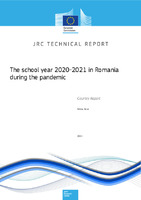| dc.description.abstract | This report presents the educational response to COVID-19 crisis in Romania during the2020-2021 school
year, a summary in Romanian is found in the annex. Through a qualitative methodology, the project aimed to
understand how different educational systems adapted to the pandemic situation in the 2020-2021 school
year and to map some good practices in this regard. The report relies on 29 semi structured interviews
conducted between March and April 2021 with Romanian stakeholders (e.g., school staff, students, parents,
NGOs representatives), with a focus on the compulsory Romanian educational system. The main conclusion is
that the 2020-2021 school year was marked by ad hoc decisions guided mainly by the public health
authorities though centralised approach and less or at all has it answered to education-based reasons. In this
context, remote schooling prevailed, and it mostly took the form of synchronous online classes. This marks a
plain transition of traditional classes in the new, screen mediated environment. Whereas the main issue
discussed in the public space, and partially addressed by authorities, was inequality in access –understood as
having access to a digital device and an internet connection– less visible but important issues were neglected.
Some of these issues discussed in the report are: the lack of educational digital content and genuine digital
pedagogies, lack of curriculum adjustments, lack of profound, systemic and effective inclusive approach for
vulnerable students. A hybrid system was also tried, but despite its very promising opportunities, various
issues in infrastructure made its implementation flawed.
The first consensus among the interviewees was that although the Romanian educational system managed to
take an important step forward on the digitisation path, there is still much more to be improved. Secondly,
there was a consensus on how different this school year impacted students, the phrase that best described
the situation being: the rich get richer, and the poor get poorer. The report ends presenting some proposals for
improving education in a similar situation. |

